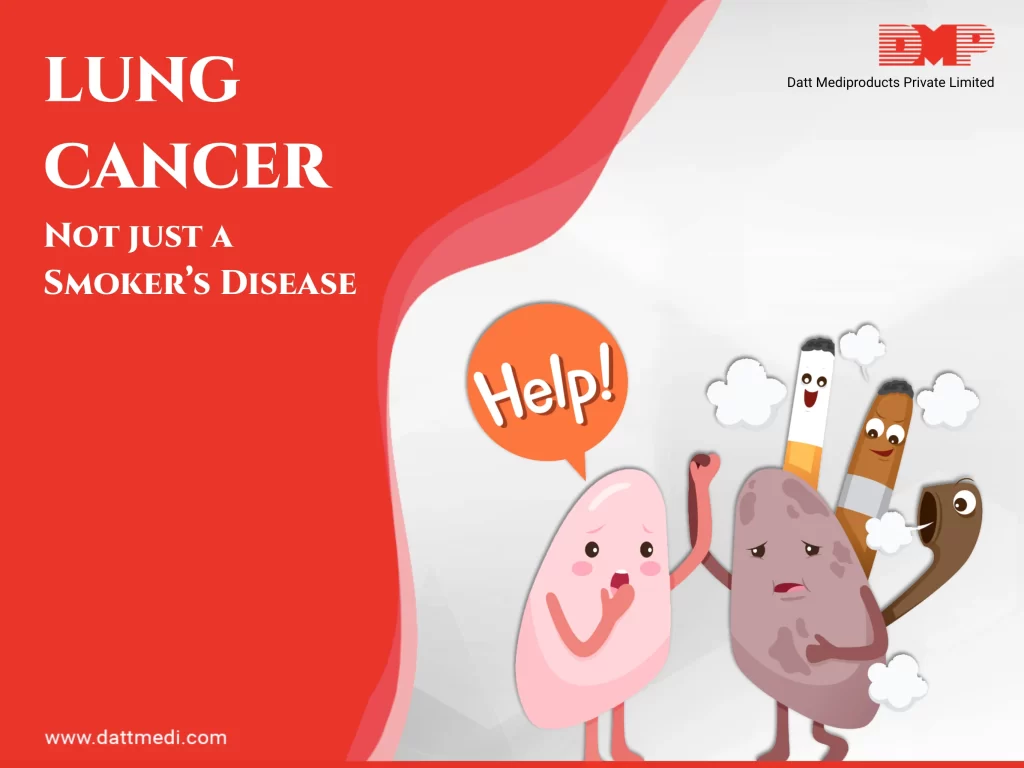
Did you know that lung cancer is responsible for the highest number of deaths in India? This number even exceeds the deaths caused by other types of cancers including ovarian, breast, prostate and colon, put together.
FACT: 50% of the patients suffering from lung cancer had never smoked.
Lung Cancer, which originates in one or both the lungs, is defined as an uncontrolled growth of abnormal cells in the lungs. These abnormal cells can grow into the tumorous form and interfere with the normal functioning of the lungs.
As per the WHO study, 70% of lung cancer occurs in patients aged 65 years or above, while the rate of lung cancer patients is just 3% in people aged 45 years or below. The main reason for lung cancer is smoking followed by prolonged exposure to toxic and polluted air, asbestos fibers and radon gas.
Types of Lung Cancer
Small Cell Carcinoma:
- This is the fast-growing type of lung cancer and occurs mostly in smokers.
- The tumorous growth first starts in the bronchi (the breathing tubes) and then spreads throughout the body (metastasizing).
- Symptoms include cough, chest pain, phlegm, or shortness of breath.
Non-Small Cell Lung Carcinoma:
- NSCLC affects both smokers and non-smokers. This is the most common type of lung cancer accounting for 85% of all lung cancers.
- NSCLC is sub-classified into Adenocarcinoma, Large Cell Carcinoma and Squamous cell carcinoma, based upon the types of cells the tumor consists of.
- NSCLC is often asymptomatic until the cancer reaches a more advanced stage.
- Symptoms include chronic cough, weight loss, fatigue, chest or back pain, shortness of breath or coughing up blood.
Complications of Lung Cancer
- Shortness of breath: As the cancer cells grow, they block the airways making it harder for the lungs to expand fully to inhale and thus causing shortness of breath.
- Coughing up blood: The cancer cells may cause bleeding in the airways, leading to the patient coughing up blood, which is called Hemoptysis.
- Pain: In advance stages, the lung cancer metastasizes to other body parts like the bones that cause pain.
- Fluid in the chest (pleural effusion): As the tumor cells grow, the fluid gets accumulated in the pleural space (chest cavity) which causes shortness of breath.
- Cancer metastasis: Lung cancer originates in the lungs but often spreads to different body parts like the brain and the bones. Once cancer becomes metastatic, it becomes difficult to treat it.
Lung Cancer no longer just a Smoker’s Disease?
Smoking is the major cause of Lung Cancer but this is not the only factor which is taking your life away. There is an increased risk of the disease if you are an active smoker and also if you are exposed to second-hand smoke (passive smoker). But, lung cancer has been seen affecting those people who have never smoked in their lives.
Following are a few other risk factors that could lead to lung cancer:
- Passive Smoking: Any exposure to a secondhand smoke is also as harmful as smoking.
- Toxic Air & Air pollution: An exposure to radon gas, which is produced by the natural break down of uranium in the soil, water or rock and which ultimately mixes with the air that we breathe in, is also unsafe.
- As per a report of the Indian Medical Association (IMA) released in November 2017, the air quality index of Delhi breached 999 which was equivalent to smoking 50 cigarettes a day. International Agency for Research on Cancer (IARC) which is a part of the World Health Organization has classified the outdoor pollution as carcinogenic.
- Genetic Basis/Family History: People who have a family history of lung cancer are at an increased risk of developing the disease.
- Compromised Immune System: People who have compromised immune system like those suffering from indications like HIV and people who are on long-term steroid treatments are also at risk of developing lung cancer.
There is no 100% guaranteed sure-fire way to prevent lung cancer, but there are a few ways in which you can reduce the risk.
- Quit Smoking and avoid other tobacco-related products
- Don’t Start Smoking
- Avoid Passive Smoke
- Avoid carcinogens
- Eat a healthy & nutritious diet full of fruits and vegetables
- Exercise regularly
- Breathing exercises: deep inhalation and exhalation early mornings.
Globally, Lung Cancer accounts for nearly 1 in 5 cancer deaths. Once considered a man’s disease and a smoker’s disease it is now taking lives of women too. We need to follow a healthy lifestyle and be aware of the signs and symptoms of the disease.
Creating awareness, approaching the doctor at the right time and seeking diagnosis with appropriate treatment can help save lives. November is “Lung Cancer Awareness Month” and we @ Datt Mediproducts are spreading awareness.




